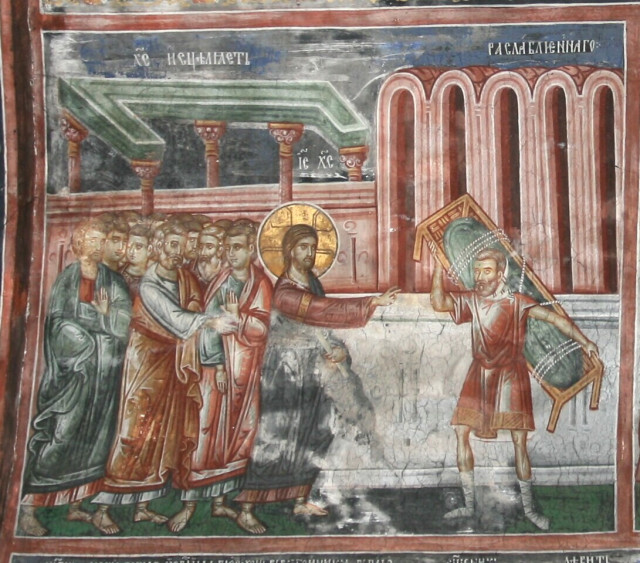- Home
- About us
- Students
- Courses
- Research
- Library
- News & Events
- Gallery
- Contact
- Our Blog
Latest News

The Healing of the Paralytic at the Pool of Bethesda:
A Brief and More Practical Reflection
Jn 5:1-15

by Assoc. Professor Philip Kariatlis (Sub-Dean)
On the fourth Sunday after Pascha, the Orthodox Church commemorates a sacred event from our Lord’s earthly ministry—a miracle. It concerns the healing of a man who had been paralysed for a long time, laying by a Sheep’s Pool, at a place called Bethesda. The message of the Gospel reading is so rich that only two aspects will be focused upon with the hope that Christ’s message might touch our hearts more deeply.
Turning to Christ
We are told in the Gospel that a certain man suffering with paralysis had been ill for thirty-eight years. In those days, this was virtually a lifetime. And yet, there he remained—patient, persistent, and hopeful. Indeed, what is more heartbreaking is that he was not only paralysed, not only destined to lie helplessly near the pool, but also that he was utterly alone. He literally had no one—not a single person—to help him into the water when it was stirred. His suffering was not merely physical but deeply existential: he was forsaken, forgotten, and entirely alone.
There was, in truth, no more wretched, sorrowful, and, for most of us today, no more despairing condition than that in which this man found himself. And yet, precisely in this condition of paralysis, abandonment, and misery, he came to encounter Christ; and in turning to Him in that encounter, we are told that he was healed. Indeed, this providential meeting with Christ, is profoundly instructive for us today.
It is precisely in those very moments when we feel utterly defeated, completely exhausted by the burdens of life, when we reach the limits of our endurance and in those moments of defeat turn to Christ, that we are able to we receive comfort and relief. It is in turning to Him that we are able to receive solutions to problems we had deemed unsolvable.
And, as we hear in the Psalms: “The Lord is near to those who are broken-hearted.”(Ps 34:18). Elsewhere in the Psalm we hear that those whose circumstances in life may have humbled them, or may have exhausted them, they are the ones who will rejoice and be glad: Let me hear joy and gladness; let those rejoice whose bones have been humbled [ἀκουτιεῖς με ἀγαλλίασιν καὶ εὐφροσύνην· ἀγαλλιάσονται ὀστέα τεταπεινωμένα]” (Ps 51:8).
This is why the saints of the Church have always regarded the trials of life not as curses or punishments, but as hidden blessings. For these help re-orient us—like a compass that has been shaken and needs to be realigned—to Christ. Difficulties in life are opportunities to re-align us towards Christ who is the fountain of all joy and solace; source of all grace and serenity; the giver of unfading life and unending love.
The Sacredness of a Person’s Freedom
The Gospel also contains a question posed by Christ to the paralytic, which may seem, at first glance, unnecessary—even strange: “Do you want to be made well?”Surely, one would have thought that after thirty-eight years of affliction, the answer is obvious! And yet, our Lord’s question is anything but redundant. It is not only essential but is filled with theological significance and meaning. Why, might one ask? Because it touches on the very heart of our human freedom.
God created the human person in “His image and according to His likeness” (Gen 1:28). This means that, having been shaped by the very life-giving and liberating breath of God, we cannot be saved by force. If salvation were forced upon us, our personhood would be utterly destroyed. God respects our freedom—even when we are sick, even when we are lost. If He were to override our freedom, He would undo the very dignity with which He endowed us. God does not treat us as objects, nor as creatures driven by blind instinct.
Thus, Christ asks the paralytic if he wants and freely desires to be healed. For healing, salvation, eternal life—these are all gifts that must be freely and truly desired, sought after and received wholeheartedly with the heart. Faith which is imposed is no faith at all. Religion without freedom is meaningless. Christ compels no one. His words are ever: “Whoever wills, let him come after me” (cf. Mk 8:34).
And so today, He poses the same question to each of us: do we truly wish to be made well? Do we truly seek salvation? Do we truly desire His Kingdom? Do we truly desire His love? The Lord reminds us that quintessentially “He is love” (cf. 1Jn 4:8); that is, He says to each one of us: “I love you”, but we must also reciprocate. We are freely invited to love Him in return, to yearn to be in His presence with all your heart, mind and soul. Indeed, our love for Christ is shown in our unwavering conviction and sustained commitment to follow a righteous life in service and love for God and those around us. Related to this: have we ever considered what the greatest sin in life is? It is that we have forgotten how deeply we are truly and endlessly loved by God.
And because we forget that God loves us, we take control! We do not entrust our lives to Him. Our modern culture often glorifies the self. We are constantly promoting ourselves, our profile, our reputation through curated social media profiles. We create personal websites and blogs where we want to show the world how good we are. We are constantly promoting self-importance obsessed with receiving more and more ‘likes’ on our social media. And the risk here is that vanity and pride inevitably creep where we end up becoming totally self-absorbed and with a false sense of control.
And in precisely such a state [w]e cannot say, “Your will be done.” And in seeking instead to do our own will—because of our vanity and lack of trust in others let alone God because we have made ourselves the measure of all things—we do not find peace. Worse, we often make matters worse and more difficult for ourselves. We forget that Christ promised to remain with us always, even to the end of time—to remain our anchor and our hope. We forget that He loves us not merely in word, but in deed—unto death; more correctly, beyond death.
In a beautiful Paschal hymn, the Church sings: “O divine, beloved and sweetest utterance of Yours! For You really and truly pledged that You will be with us unto the end of the age, O Christ. And we the faithful, clinging to Your promise, our anchor of hope, rejoice [Ὢ θείας, ὢ φίλης, ὢ γλυκυτάτης σου φωνῆς· μεθʼἡμῶν ἀψευδῶς γάρ, ἐπηγγείλω ἔσεσθαι, μέχρι τερμάτων αἰῶνος Χριστέ· ἣν οἱ πιστοί, ἄγκυραν ἐλπίδος, κατέχοντες ἀγαλλόμεθα].” Our risen Lord has given us the most precious of gifts: eternal life. As He Himself said, “Whoever believes in Me, though he die, yet shall he live” (Jn 11:25).
Indeed, this taste of eternity is not something reserved only for the hour of our biological death. We begin to taste the sweetness of eternity in the here and now—in the Church; in our life of faith, when we place our hope in Him; when we live our lives not centred on ourselves but in loving service towards those around us; and most importantly, when we strive to cultivate humility. Because when we strive to live humbly, we are not easily offended. We do not react in anger to the words of a spouse, a friend, or a relative.
For the heart that seeks humility is softened. It remains at peace, even when wounded. It learns, with God’s grace, how to forgive. And in that forgiveness, we discover inner stillness and peace. Everything around us begins to be transfigured. The Grace of God, which is more powerful than death, is precisely, the inner peace, joy and fulfilment that we feel. Everything then is filled with the grace and unfading light of Christ. As we chant in another Paschal hymn: “Now all things are filled with light—heaven, earth, and even the depths below.” We are reconciled with our brothers and sisters. Others discern this serenity and tranquility within us—and that peace becomes a light and a comfort to them.
We live each day in the quiet confidence that God loves us. We begin to love Him in return, with sincerity. We hand over our lives into His care as we say in Church, “let us commend ourselves and one another and our whole life to Christ our God.” And in so doing, we begin—even now—to taste Paradise: the Paradise of His Presence, the Paradise of His Light, the Paradise of His undying Love.
We are reminded in the Gospel reading to turn freely and joyfully toward Him, just as the paralytic did. It remains for us to freely choose to run towards the Risen Christ—the source of every joy, the wellspring of all grace, the giver of peace, for He alone leads us into the spaciousness and delight of Eternity.



.png)